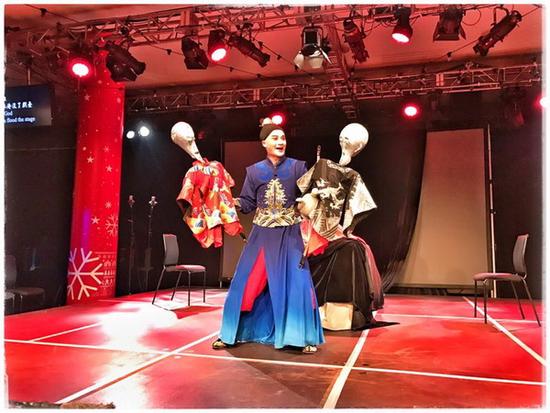The timeless classic "Hamlet" rendered in the form of a traditional Chinese opera, it's an apt commemoration of two literary giants, Shakespeare from England, and Tang Xianzu from China, on the four hundredth anniversary of their deaths. Tang Xianzu is the Ming dynasty playwright who penned the very popular Kunqu opera classic "Peony Pavilion".

The timeless classic "Hamlet" rendered in the form of a traditional Chinese opera, it's an apt commemoration of two literary giants, Shakespeare from England, and Tang Xianzu from China, on the four hundredth anniversary of their deaths.
Neither Tang Xianzu, nor Shakespeare, might have imagined there would be a show bringing their legacy together four centuries later. "I, Hamlet", a Kunqu opera retelling the household English story of Hamlet, opened at the UK's South Bank Center on December 16th. It's a way for Chinese artists to pay tribute to the two literary giants.
Truly merging east and west, lead actor Zhang Jun turns famous English lines from the original Shakespeare play into lyrical Chinese tunes typical of a Kunqu opera.
"I remember there is a line in a book, one thousand readers will have one thousand of their own versions of Hamlet. The line 'to be or not to be, that is the question' has been rendered by many many actors from various generations, and with all kinds of versions. I'm using Kunqu lyrics to read the line. This was inspired by musician Tan Dun, when I did an opera with him. I think this way of reading famous lines can bridge both audiences," said Zhang Jun, lead actor.
Zhang, a plum blossom award winner and UNESCO Artist for Peace, is arguably a leading figure in China's Kunqu opera scene, and even has a Kunqu opera center in his name in Shanghai. In the one man retelling of Hamlet, Zhang showcases his masterful singing and performing techniques by taking on four roles: Hamlet, Ophelia, the Ghost of Hamlet's Father and the gravedigger. With references to the English translations of the scripts on a screen, audiences can easily draw out how Chinese render the timeless theme of the Shakespeare play: love, hatred, life, death and revenge.
"It's very exciting when you get an actor, a performer of his stature, completely reinterpreting a play, selecting four characters, make sense to the original Shakespeare play but also make sense in the Chinese context. It's a very dramatic story, in an hour and twenty minutes. It's very exciting," said John Howkins, visiting professor at Shanghai Theatre Academy.
Kunqu opera, with a proud six-hundred-year history, is loved by Chinese fans for its lyrical lines and beautiful tunes, costumes and postures. Audiences in London get to enjoy the Chinese opera treasure with a familiar theme. A clean and simple stage is set, and an accompanying band playing western musical instruments gives the show a modern feel. Zhang Jun talked about his motive for doing such a crossover performance.
"This year is the four-hundredth anniversary of Tang Xianzu and Shakespeare's deaths. China and the UK have been communicating on culture very vibrantly. I think it's both an opportunity and challenge for our Kunqu opera performers, to create a dialogue between the two cultures, two peoples and two countries. In this case, between the two classics. I think it's very meaningful and valuable," Zhang said.
"I Hamlet" was created by a team of A-list directors, scriptwriters, composers and stage, light and costume designers from around China. It debuted in Shanghai two months ago to great success. Now the show is on a trial-run in a city with such deep theatrical traditions. And it's been quite a success so far.
"Because if you paying to see the same performance, it's not interesting. It doesn't stretch the boundaries of art. So I think it's a good way of mixing tradition and contemporary as well," said an audience member.
"Chinese culture, we know very little about what Chinese culture means to people living in China today. We know a bit about the old culture. We know very little about how contemporary Chinese interpret their culture. And we have very few opportunities to find out about it. So when someone like him comes here. That's a wonderful opportunity. And I think who came here tonight might expected a static traditional performance, would've been very surprise and very happy about it. Cause this was eclectic, wonderful acrobatic performance," said John Howkins.
The show's London performance was launched as part of the South Bank Center's "China Changing" project. The three year project is aimed at showcasing Chinese artists' experience in revamping their traditional practices in music, movies, dance and theatre.















